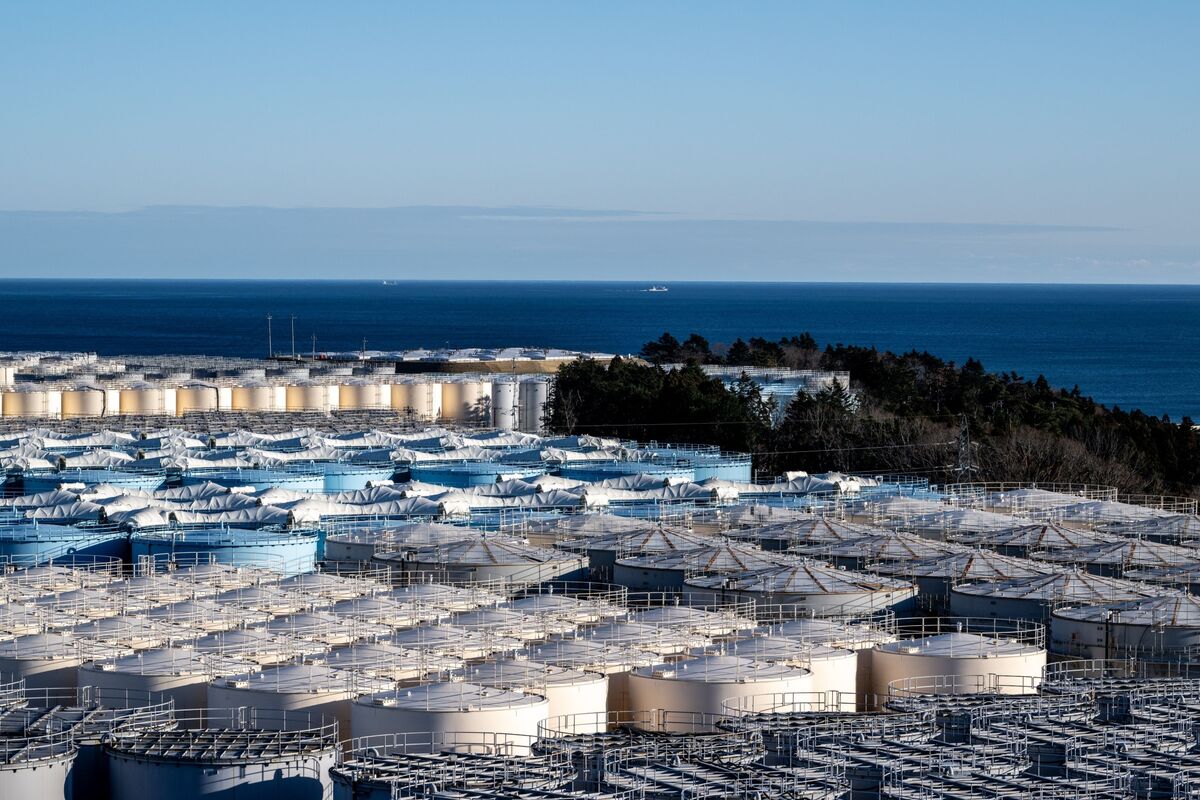edit: changed title from 'False Fukushima Fears' to 'Exaggerated Fukushima Fears', sacrificing my lovely alliteration as others have pointed out that it would be too much to say that the fears of radiation leakages are unfounded, but merely to say that this is the least bad option given previous precedent as cynesthesia has pointed out.
Image is of the large array of water storage tanks holding the tritium-contaminated water.
This week's preamble is very kindly provided by our beautiful poster @cynesthesia@hexbear.net, with some light editing. In periods where not much of earth-shattering importance is happening in the news, I hope to do this more often!
In 2011, the Fukushima nuclear incident occurred. Since then, water has been used to cool radioactive waste and debris, which contaminates the water with radioactive isotopes. Currently, TEPCO, the Japanese energy company that is reponsible to Fukushima, is storing about 1.3 million m^3^ of contaminated water (equivalent to about 500 Olympic swimming pools for our American friends) in about 1000 tanks. Approximately 100,000 m3 of contaminated cooling water is generated per year to this day. TEPCO doesn't want to store escalating volumes of nuclear waste for decades until half-lives are spent. This would mean adding substantial storage capacity every year at increased cost and risk of tank spills.
The contaminated water includes heavier isotopes like caesium as well as hydrogen's isotope, tritum. Caesium is a big atom at 137 molar mass (we love our tremendous atoms, folks) while tritium is heavy hydrogen and has only a molar mass of 3 (pathetic, low energy). The TEPCO people are using water treatment to remove heavy isotopes from water, but not tritium. The large adult isotopes are easy to remove with treatment but tritium is incorporated into water, so it blends in with the others. The treated Fukushima water contains low levels of the big isotopes but still contains tritium.
Isotopes release radiation that damages the body's cells. The longer an individual molecule containing an isotope is in a body, the more likely it is that the isotope will go BRAZAP and release radiation that fucks up the cells. Bioaccumulation is a toxicology term for how certain contaminants can accumulate in the food cycle. For example, algae eat contaminants, then the algae is eaten by bugs, then bugs by fish, then fish by people. Isotopes that are bioaccumulative like our large adult son caesium are more hazardous. Tritium is not bioaccumulative because it is effectively part of water. Water cycles through bodies quickly - that's why you sweat and pee and get thirsty. 
Fukushima water would be treated and then then mixed with seawater at a ratio of 1:800 before it is pumped 1km offshore. Each year approximately 166,000 m3 of treated water will be released, which will draw down the volume of contaminated water being stored over a few decades. Real-time stats associated with the release are found here. At the point of discharge, water contains about 207 Bq/L of radioactivity, about 16 times greater than the 10-15 Bq/L background level in the ocean overall. Drinking water guidelines for tritium radioactivity range from 1,000-10,000 Bq/L, if one were to drink seawater.
In wastewater treatment terms, this is a small amount of dilution in a very large body of water. It is unlikely to have any measurable impact per the terms of Western science. In the context of mother nature taking yet another one for the team and environmental distress, this sucks. In the context of making the best of a shitty situation, the Fukushima water release is peanuts compared to the many other environmental liabilities that are not addressed. For example, the Hanford Site is an example of a nuclear wastewater storage facility gone/going wrong in Oregon.
Ending note by 72: By far the biggest impact of the release of this water won't be its direct effects, but those on commerce and international relations. Almost half of Japanese aquatic exports go to China, comprising 8% of all Japanese firms shipping goods to China, and they have now been cut off due to their anger at Japan. Perhaps this reaction and the cancellation of imports was inevitable, as nuclear power and radiation in general is a poorly understood, frightening, and thus easily exploitable topic in every country. China is not the first country to use a misunderstanding of radiation risk to try and achieve a goal - Germany seems very pleased with itself - and they will not be the last.
In all: it is unequivocal that China is massively exaggerating the risks of this water's release. However, the bellicose rhetoric and actions of Japan, South Korea, and America are a much greater danger to the region, and none of the three seem to be in any hurry to try diplomacy instead of increasing military budgets and gearing up for war.
It's that time again - every two months I give myself a week off, to rest and recalibrate. Your regularly scheduled programming will resume next week.
Here is the map of the Ukraine conflict, courtesy of Wikipedia.
Links and Stuff
The bulletins site is down.
Examples of Ukrainian Nazis and fascists
Examples of racism/euro-centrism during the Russia-Ukraine conflict
Add to the above list if you can.
Resources For Understanding The War
Defense Politics Asia's youtube channel and their map. Their youtube channel has substantially diminished in quality but the map is still useful.
Moon of Alabama, which tends to have interesting analysis. Avoid the comment section.
Understanding War and the Saker: reactionary sources that have occasional insights on the war.
Alexander Mercouris, who does daily videos on the conflict. While he is a reactionary and surrounds himself with likeminded people, his daily update videos are relatively brainworm-free and good if you don't want to follow Russian telegram channels to get news. He also co-hosts The Duran, which is more explicitly conservative, racist, sexist, transphobic, anti-communist, etc when guests are invited on, but is just about tolerable when it's just the two of them if you want a little more analysis.
On the ground: Patrick Lancaster, an independent and very good journalist reporting in the warzone on the separatists' side.
Unedited videos of Russian/Ukrainian press conferences and speeches.
Telegram Channels
Again, CW for anti-LGBT and racist, sexist, etc speech, as well as combat footage.
Pro-Russian
https://t.me/aleksandr_skif ~ DPR's former Defense Minister and Colonel in the DPR's forces. Russian language.
https://t.me/Slavyangrad ~ A few different pro-Russian people gather frequent content for this channel (~100 posts per day), some socialist, but all socially reactionary. If you can only tolerate using one Russian telegram channel, I would recommend this one.
https://t.me/s/levigodman ~ Does daily update posts.
https://t.me/patricklancasternewstoday ~ Patrick Lancaster's telegram channel.
https://t.me/gonzowarr ~ A big Russian commentator.
https://t.me/rybar ~ One of, if not the, biggest Russian telegram channels focussing on the war out there. Actually quite balanced, maybe even pessimistic about Russia. Produces interesting and useful maps.
https://t.me/epoddubny ~ Russian language.
https://t.me/boris_rozhin ~ Russian language.
https://t.me/mod_russia_en ~ Russian Ministry of Defense. Does daily, if rather bland updates on the number of Ukrainians killed, etc. The figures appear to be approximately accurate; if you want, reduce all numbers by 25% as a 'propaganda tax', if you don't believe them. Does not cover everything, for obvious reasons, and virtually never details Russian losses.
https://t.me/UkraineHumanRightsAbuses ~ Pro-Russian, documents abuses that Ukraine commits.
Pro-Ukraine
Almost every Western media outlet.
https://discord.gg/projectowl ~ Pro-Ukrainian OSINT Discord.
https://t.me/ice_inii ~ Alleged Ukrainian account with a rather cynical take on the entire thing.
Last week's discussion post.

I am taking a break from writing about the Russian economy, and want to mix in my posts with some Chinese economy as well. So I just spent the last few hours translating an episode of recent Wen Tiejun’s video podcast: The real estate crisis, “want to save you but it’s not easy” (Note: this talk was in a casual, colloquial conversation format, it actually makes it harder to translate into text, so keep in mind that I had to edit and reshuffle some sentences to make them readable. Also, this is a rough translation, so I apologize for not delivering a professionally translated article).
This is Part 1 of a three episode video podcasts about the real estate bubble in China. I will follow up on the next two when I have more time, so stay tuned.
spoiler
.
spoiler
spoiler
.
spoiler
.
spoiler
.
End of Episode 1. There are two more episodes that go even more in-depth about the crisis, I will translate when I have time.
Thank you so much for translating this. Wen Tiejun's Ten Crises was such an amazing book, glad to read more by him.